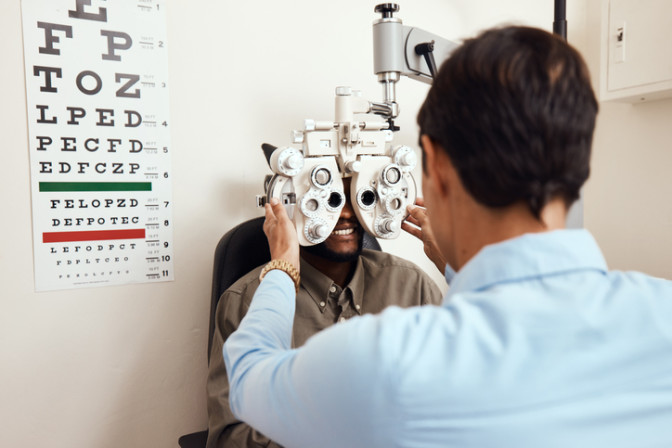50% OFF a Complete Pair of Glasses
*Restrictions apply. Click here for details.
Low Vision Specialists
Access Exceptional Low Vision Care at Clarkson Eyecare

If you are experiencing blurry vision and have difficulty completing everyday activities such as reading and driving, you may be suffering from low vision. Low vision is most often a symptom of a condition, not a condition on its own, and is common in those suffering from vision problems like age-related macular degeneration, cataracts, diabetic retinopathy, or glaucoma.
Even if you are suffering from changes in your vision, it's not too late to get an eye exam. Our team of low vision specialists can help you begin your road to recovery and maximize your remaining vision.
Find a Clarkson Eyecare Low Vision Specialist Near You

The low vision specialists at Clarkson Eyecare can help you diagnose and treat low vision at nearly 200 locations across Missouri, Illinois, Florida, Georgia, Texas, New Jersey, Kentucky, Michigan, Ohio, and Minnesota. Click to find a location near you.
What Is Low Vision?
Unlike total blindness, when an individual has no light perception, someone dealing with low vision still has light perception. Individuals with low vision can have visual fields that include impairments such as blind spots, poor night vision, and blurry sight. It is important to note that people with low vision may experience different symptoms and varying degrees of the same symptom. Low vision cannot be corrected with glasses, contact lenses, or surgery, and is diagnosed in patients with visual acuity worse than 20/70 that isn’t fixed with prescription lenses.
Risk Factors for Low Vision
Low vision can be caused by several different conditions that are genetic or environmental:
Macular degeneration
Diabetes/Diabetic retinopathy
Glaucoma
Cataracts
Retinitis pigmentosa
Inherited diseases
Eye injury
Symptoms of Low Vision
If you are experiencing any of the following symptoms, be sure to schedule an eye exam with your eye care provider to diagnose low vision. The most common symptoms of low vision include:
Loss of central vision - a blur or a blind spot in the center of your visual field that doesn’t impact your peripheral vision
Night blindness - when one cannot see outside at night or in dimly lit areas
Loss of peripheral vision - also known as tunnel vision, this is when one loses side vision in both or one eye or when one cannot see above or below eye level
Blurred vision - when the visual field is out of focus even with corrective lenses
Hazy vision - field of vision seems to be covered with a film or glare
Correct Refractive Errors with the Specialists at Clarkson Eyecare
After receiving a comprehensive eye exam to diagnose low vision, the optometrists at Clarkson Eyecare can develop a custom eye care treatment plan that is right for you and your vision rehabilitation needs. Rehabilitating your vision is similar to physical therapy but for your eyes, and there are several different rehabilitation services available. There are a few steps to a vision rehabilitation program. First, your optometrist will evaluate your vision, conduct a few eye examinations to assess your visual function, and then create your rehabilitation plan. Your rehabilitation plan might include environmental modification and the use of low vision devices. The goal of low vision rehabilitation is to help preserve your sight, and the low vision specialists at Clarkson Eyecare are here to help. Low vision rehabilitation will not reverse any damage that has already occurred, but it can help you keep the sight you have left.
Frequently Asked Questions About Low Vision
There are a wide variety of eye conditions that can cause low vision. The most common being:
Macular degeneration - a disorder that affects the retina
Diabetes - can cause daily vision changes including diabetic retinopathy
Glaucoma - will cause damage to the optic nerve
Cataracts - caused by long-term exposure to UV radiation or an injury
Retinitis pigmentosa - an inherited disease that will eventually destroy night vision
Injuries - stroke, brain damage, eye trauma, or head trauma
Preventing low vision depends on multiple factors. If the underlying condition is diagnosed early, such as diabetic retinopathy or cataracts, it can be prevented entirely or reversed. If a genetic disease causes low vision, you may be able to seek vision rehabilitation to protect your remaining vision.
It is important to have annual eye exams to stay on top of your ocular health. This way if an issue does arise, your optometrist can treat it quickly.
It is possible to have low vision and be legally blind. To be considered legally blind, your vision is 20/200 or below out of your better eye or your field of vision is less than 20 degrees. This means that if an object is 200 feet away, you would have to be 20 feet from it to see it clearly. Those diagnosed with low vision have a visual acuity equal to or above 20/70 vision.
Because of the two eye condition’s different diagnostic criteria, most individuals with low vision are not considered legally blind. Legal blindness can occur if the symptom is not addressed, making it essential to schedule an eye exam when you start to notice changes in your vision.
Low vision cannot be corrected with prescription eyeglasses, contact lenses, or surgery. Low vision can be treated to a degree with vision aids like magnifying glasses, reading prisms, or telescopic glasses.
The following visual aids can help you improve your quality of life and maintain your independence by continuing to do the things you love to do:
Text-reading software
Check-writing guides
High-contrast clocks and watches
Talking watches and clocks
Large-print publications
Clocks, phones, and watches with large numbers
Books on DVD/CD/audiocassette
Schedule a Low Vision Exam at Clarkson Eyecare

Having trouble with your sight? Worried you may have low vision or an underlying vision condition? Be sure to schedule an exam with our vision care experts to determine the best treatment to restore or maintain your vision
